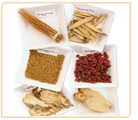Medicinal Herbs For Menopause
 There are a range of benefits associated with using different kinds of medicinal herbs to relieve the symptoms of menopause. This article discusses some of menopause�s causes, stages and symptoms and the various kinds of medicinal herbs available for treating them.
There are a range of benefits associated with using different kinds of medicinal herbs to relieve the symptoms of menopause. This article discusses some of menopause�s causes, stages and symptoms and the various kinds of medicinal herbs available for treating them.
Medicinal herbs: What exactly is menopause?
Menopause is the last menstrual period in a woman�s life. It heralds the end of the reproductive years in a similar way that the first menstrual period begins the start.
Since Neanderthal man, plants and herbs have been used for healing purposes and maintaining good health. Even as medical science has progressed, methods and ideas based on herbal healing have grown in different countries and across different cultures throughout the world.
Summarized briefly, as women begin to approach menopause the creation of hormones (estrogen) in their ovaries starts to slow down - eventually to a point where menstruation ceases altogether.
During menopause women can suffer a variety of symptoms. Some of the most common symptoms include: Menstrual period irregularities, hot flashes, mood swings, depression, insomnia, and weight gain.
*Because a significant amount of pharmaceutical drugs are plant based, one should keep in mind that although herbs are less powerful, they still behave like drugs. Herbs should also be used with care, even though side effects from herbs are minimal, if at all.
Types of medicinal herbs for menopause
There are two types of medicinal herbs that exist for menopause symptoms - phytoestrogenic and non-estrogenic herbs. Phytoestrogenic herbs contain phytohormones (compounds similar to the body�s own hormones), while non-estrogenic herbs help to stimulate the body�s own hormonal production.
Phytoestrogenic herbs
Phytoestrogenic herbs for menopause are plants that contain phytoestrogens, containing chemical structures similar to human estrogen.

herbs-medicinal
There are several medicinal herbs which have phytoestrogens, and many are available as herbal remedies or supplements. Phytoestrogenic herbs often help people who are suffering from hormone related ailments, because they copy the body�s own source of estrogen hormone. Phytoestrogens appear in large doses in herbs such as black cohosh, ginseng, soy, red clover and dong quai. Click on the following link to read more about phytoestrogen herbs.
Medicinal Herb: Wild Yam (Dioscorea villosa)
This perennial vine produces tubers which are harvested and dried before use. The phytosterols found in wild yam help to reduce the uptake of cholesterol in the intestine, helping to reduce blood cholesterol levels. These phytosterols are also precursors to oestrogen and progesterone in the body. One 2005 study revealed that a group of women including wild yam in their diet for 30 days significantly increased sex hormones, antioxidants and lipids in the blood, and in turn reduced the risk of breast cancer and cardiovascular disease in post menopausal women.
Non estrogenic herbs
Non-estrogenic herbs don�t possess chemical structures similar to estrogen. These medicinal herbs work by stimulating the body�s endocrine system into producing more hormones on its own. Some examples of non-estrogenic herb treatments can be found at this link.
What medicinal herbs for menopause symptoms should I use?
Medicinal herbs that treat menopause symptoms continue to increase in popularity. One of the good things about natural herbs is that they often do not have unwanted side effects (though each supplement should be taken on its merits and on the basis of other factors such as health and other medications) and research often confirms their therapeutic applications in conjunction with a healthy diet and lifestyle. For this reason medicinal herbs can be used for menopause symptoms and to promote general well-being.
To learn more about the best medicinal herb treatments for menopause symptoms click here.



























